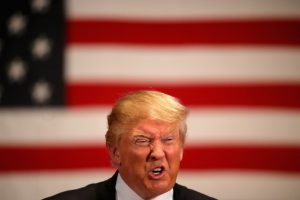‘This is the End of My Presidency. I’m F**ked!’

Special Counsel Robert Mueller’s report was finally released today and, although it still has more than 900 blacked out sections, it did reveal that President Donald Trump tried to obstruct justice in several instances and in various ways, but Mueller decided he couldn’t indict a sitting president.
In the three weeks since Mueller delivered his report to Attorney General William Barr, Donald Trump has bragged that the report completely exonerated him, and that it proved his did nothing wrong. Even Barr himself has tried to spin the report as a total nothingburger, as Trump fans like to say.
Trump allies have argued that the whole investigation was a waste of time and millions of dollars because it found nothing. Well, that now doesn’t seem to be the case.
What the so-far redacted report does include is information on what Mueller concluded Trump did to try to interfere with investigations, classic acts of obstruction of justice.
The report released today includes details about four events that Mueller believed rose to the level of obstruction of justice.
First, Trump asked then-FBI Director James Comey to stop investigating Michael Flynn, Trump’s former national security advisor. The FBI was looking into conversations Flynn had with Russians, including the highest ranking Russian spy in the US. Flynn would later plead guilty for lying to the FBI about what? His conversations with Russians. Mueller also found that Comey’s version of the conversation with Trump was truthful and Trump’s was not.
Second, Mueller concluded that Trump later fired Comey in hopes it would stop the Russia investigation, and that there was no evidence it was because of Comey’s handling of the FBI’s investigation of Hillary Clinton’s emails. Trump was trying to protect himself, Mueller concluded.
Third, Mueller found evidence that Trump tried to influence the cases against Michael Flynn, Paul Manafort, and Michael Cohen by sending messages through social media to the defendants, as well as the juries. The report states that “Trump intended to encourage Manafort to not cooperate with the government”.
Lastly, Mueller reported that Trump called White House counsel Don McGahn on June 17, 2017, and directed him to fire Mueller, claiming that Mueller had conflicts of interest. McGahn refused and offered to “resign instead of triggering what he regarded as a potential Saturday night massacre.”
What’s a Saturday night massacre? No, not a literal killing, but a reference to what Richard Nixon did during the Watergate scandal.
Just five months into the Watergate investigation, Nixon directed Attorney General Elliot Richardson to fire the independent special prosecutor assigned to look into the break-in at the Democratic headquarters and the subsequent cover up. Attorney General Richardson refused and instead resigned. Nixon then ordered the Deputy Attorney General to fire the special prosecutor, but he too refused and also resigned. Nixon then asked the next highest Department of Justice official, Solicitor General Robert Bork, to do it and he did.
A court later ruled that he firing was illegal, but the political and legal damage had already been done.
Of course, Nixon later resigned when Congress was ready to impeach him.
Don McGahn clearly was the only adult in the room when Trump tried to launch this Machiavellian scheme to save himself. No one else thought to stop him? No one else remembered or had studied the self-destruction of Richard Nixon, a president that thought he was above the law?
The fact that Trump tried but failed to obstruct justice shouldn’t be applauded as innocence. If you tried to rob a bank but were stopped by the security guard, were you not still trying to commit a crime?
Only in Trump World can someone claim victory in an investigation that concluded he tried to obstruct justice in various ways, his campaign openly welcomed the help of a foreign government to win the election, and he purposely misled the public as to his direct involvement in covering up their interactions with Russians.
The report also details Trump’s reaction when he heard that a special counsel had been appointed. The report quoted then-Attorney General Jeff Session’s Chief of Staff, Jody Hunt, who took notes of the meeting.
When Trump was informed by Sessions that Robert Mueller had been appointed as Special Counsel to investigate Russia’s interference in the 2016 election and possible collusion by the Trump campaign, Trump slumped back in his chair.
“Oh my God. This is terrible. This is the end of my Presidency. I’m fucked.”
Does this sound like the words of an innocent person?
Trump must have known that any credible investigation into his actions and those of many close advisors could reveal exactly how many of them interacted with Russians and how they excitedly anticipated their help in winning the 2016 election.
Although the Republican-led House investigations had mostly provided political cover for Trump, a truly independent investigation clearly posed a real threat.
We may never see the final complete Mueller report because of some sensitive international spying details, but enough has now been released to know for sure that Trump tried, and in some ways succeeded, to obstruct justice. The fact that he was either unsuccessful or stymied by responsible staffers does not exonerate him.
Some may chalk his actions up to being naive of the law or understanding the acceptable actions of a president, but it seems more that Trump truly believes he can do anything he wants and not face any consequences for his actions.
He once famously said he could shoot someone on Fifth Avenue and not lose a vote. We all thought that was just political exaggeration.
But, if Congress or prosecutors do nothing after the Mueller report, then Trump’s instincts will be reinforced, and he will believe more than ever that he can get away with anything. And that is a dangerous precedent for any president. Especially this one.


 Arturo Castañares
Arturo Castañares


